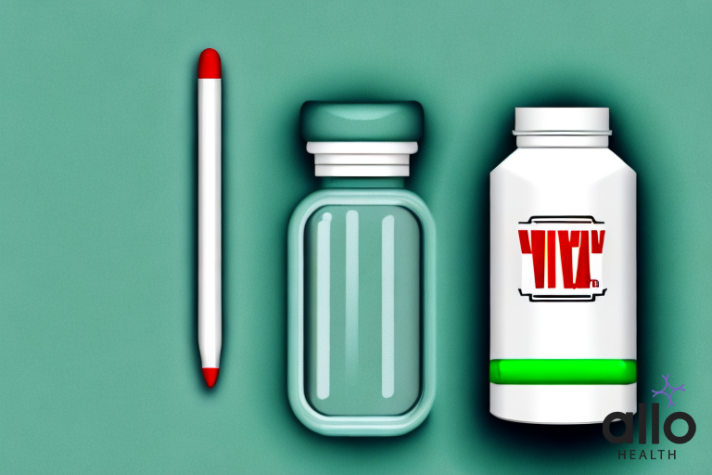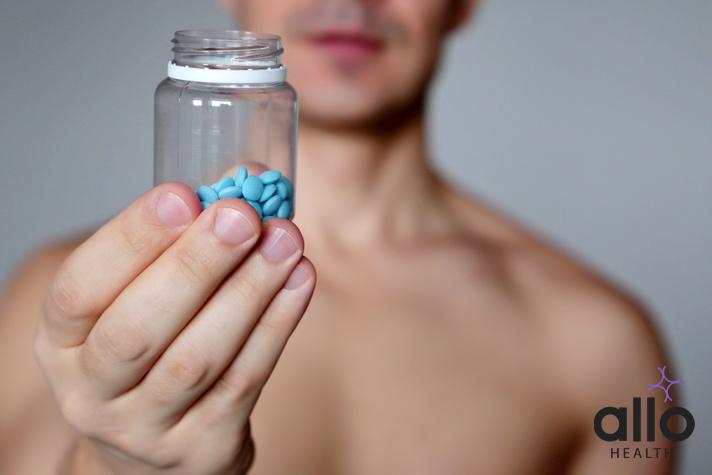What Is The Antidote For A Viagra Overdose?

Allo Health is dedicated to personalized well-being, offering support and trusted information tailored to individual health goals. The platform emphasizes human-generated content, led by a distinguished medical team of experts, including physicians and sexual health specialists. Their commitment to credibility involves rigorous fact-checking, authoritative research, and continuous updates to ensure accurate, up-to-date information. Allo Health's unique approach goes beyond conventional platforms, providing expert-led insights and a continuous commitment to excellence, with user feedback playing a crucial role in shaping the platform's authoritative voice.

Dr Sanina Mansoor holds MBBS degree from Yenepoya university,Mangalore.She has 8 years of experience working as a medical officer at various health centres and medical colleges.
Why This Was Upated?
Our experts continually monitor the health and wellness space, and we update our articles when new information became available.
Updated on 12 June, 2024
- Article was updated as part of our commitment to diversity, equity, and inclusion.

"The following blog article may discuss medical treatments and interventions. However, it is important to note that the information provided is for general educational purposes only and should not be considered as a substitute for professional medical advice, diagnosis, or treatment. Always seek the guidance of a qualified healthcare professional for personalized medical advice.
Book consultation
Medical treatments are complex and should be tailored to individual circumstances. The information presented in this blog may not be applicable to everyone, as each person's medical condition, history, and needs are unique. Only a qualified healthcare professional can evaluate your specific medical situation, consider relevant factors, and provide appropriate recommendations for diagnosis, treatment options, and monitoring.
It is crucial to note that self-diagnosis, self-medication, or relying solely on the information provided in this blog for treatment decisions can have serious health consequences. "
Viagra is a medication designed to treat erectile dysfunction in men. It works by increasing blood flow to the penis, helping men achieve and maintain an erection during sexual activity. While this medication can be very effective when used correctly, it can also be dangerous when misused or taken in excessive amounts. Overdosing on Viagra can be a serious and potentially life-threatening condition, which is why it’s important to understand the symptoms, risks, and potential antidotes for this type of overdose.
What Is Viagra?
Viagra is the brand name for a medication called sildenafil citrate, and it is primarily used to treat erectile dysfunction (ED). Developed by the pharmaceutical company Pfizer, Viagra was originally approved by the U.S. Food and Drug Administration (FDA) in 1998. It is now widely prescribed and used globally.
- Mechanism of Action:
-
- Viagra works by inhibiting an enzyme called phosphodiesterase type 5 (PDE5). This enzyme is responsible for breaking down cyclic guanosine monophosphate (cGMP), a chemical messenger that helps relax smooth muscle tissues and increase blood flow in the penis.
- By inhibiting PDE5, Viagra enhances the effects of cGMP, promoting better blood flow to the penis during sexual stimulation. This improved blood circulation helps men achieve and maintain an erection.
- Indications: The primary indication for Viagra is the treatment of erectile dysfunction, which is the inability to achieve or maintain an erection sufficient for sexual activity. It is important to note that Viagra does not induce sexual arousal and works in response to sexual stimulation.
- Dosage and Administration:
-
- Viagra is typically taken orally, in the form of a tablet, and is usually prescribed in doses ranging from 25 mg to 100 mg. The recommended starting dose is often 50 mg, taken approximately 30 minutes to an hour before sexual activity.
- The effectiveness of the medication may vary among individuals, and healthcare providers may adjust the dosage based on the patient’s response and tolerance.
- Duration of Action: Viagra’s effects typically last for about four to six hours, during which time a man may experience improved erectile function when sexually stimulated.
- Precautions and Contraindications:
-
- Individuals taking medications containing nitrates, commonly used to treat heart conditions, should avoid Viagra as it can potentiate the hypotensive effects.
- Viagra is generally considered safe for most men, but it may have interactions with certain medications or medical conditions. It is crucial to inform healthcare providers about any existing health conditions and medications being taken before starting Viagra.
- Side Effects:
-
- Common side effects of Viagra include headaches, facial flushing, indigestion, and nasal congestion. These side effects are usually mild and temporary.
- In rare cases, serious side effects such as sudden vision or hearing loss have been reported. Any sudden changes in vision or hearing should be promptly reported to a healthcare provider.
- Generic Versions: Sildenafil, the active ingredient in Viagra, is now available in generic form. Generic versions are often more affordable than the brand-name medication and have the same therapeutic effects.
It’s important to note that Viagra should only be taken under the supervision of a healthcare professional, and individuals should follow their healthcare provider’s recommendations regarding dosage and usage. As with any medication, potential risks and benefits should be discussed with a healthcare provider to determine if Viagra is a suitable treatment option.
Appropriate Viagra Doses
The appropriate Viagra dosage varies among individuals, and it is essential to follow the guidance provided by a healthcare professional. The recommended dose of Viagra (sildenafil) is influenced by factors such as a person’s overall health, the severity of erectile dysfunction (ED), and any other medications they may be taking. Here is an overview of the typical dosing guidelines:
- Starting Dose:
- The standard starting dose for Viagra is 50 mg. This is taken orally, usually about 30 minutes to an hour before anticipated sexual activity.
- The medication should be taken on an empty stomach for optimal absorption. However, it can be taken with or without food.
- Adjustments Based on Response:
- Depending on how well an individual responds to the initial dose and any potential side effects, a healthcare provider may adjust the dosage.
- If the 50 mg dose is effective but causes some side effects, the healthcare provider may recommend a lower dose (e.g., 25 mg). On the other hand, if the initial dose is not effective, a higher dose (e.g., 100 mg) may be prescribed.
- Maximum Recommended Dose:
- The maximum recommended dose of Viagra is 100 mg per day. Taking higher doses does not necessarily result in a more significant improvement in erectile function and may increase the risk of side effects.
- It’s crucial not to exceed the prescribed dosage, as doing so can increase the risk of adverse effects without providing additional benefits.
- Considerations for Special Populations:
- Elderly individuals or those with liver or kidney impairment may be more sensitive to the effects of Viagra. In such cases, healthcare providers may start with a lower dose and adjust as needed.
- Individuals taking certain medications or with specific medical conditions may require dosage adjustments or may not be suitable candidates for Viagra. It’s essential to inform the healthcare provider about all current medications and medical history.
- Duration of Action: Viagra’s effects typically last for about four to six hours. It is important to note that the medication does not result in continuous, spontaneous erections but enhances the natural response to sexual stimulation.
- Generic Versions: Generic sildenafil, which has the same active ingredient as Viagra, is available in various doses. The dosing recommendations for generic versions may be similar to those for Viagra, but specific instructions may vary.

It’s crucial to emphasize that individuals should never self-prescribe or adjust their Viagra dosage without consulting a healthcare professional. A thorough discussion with a healthcare provider is necessary to determine the most appropriate dosage based on individual health status, potential interactions with other medications, and the presence of any underlying medical conditions. Additionally, regular follow-up appointments allow for the assessment of effectiveness and the management of any side effects.
Viagra Overdose Symptoms
Viagra (sildenafil) is generally well-tolerated when used as directed, but taking more than the prescribed dosage can lead to an overdose. It’s essential to follow healthcare providers’ instructions carefully and not exceed the recommended dose. Symptoms of a Viagra overdose can vary in severity, and immediate medical attention is necessary if an overdose is suspected. Here are potential symptoms of a Viagra overdose:
- Increased Severity of Common Side Effects: Overdosing on Viagra may intensify common side effects, such as headaches, facial flushing, indigestion, and nasal congestion. These symptoms may become more pronounced and persistent.
- Priapism: Priapism is a rare but serious side effect characterized by a prolonged and painful erection lasting more than four hours. While Viagra is intended to enhance normal erectile response to sexual stimulation, an overdose can lead to sustained erections that may require medical intervention to prevent complications.
- Hypotension (Low Blood Pressure): Excessive sildenafil can lead to a drop in blood pressure, causing symptoms such as dizziness, lightheadedness, fainting, or blurred vision. This is particularly concerning for individuals with underlying cardiovascular conditions or those taking medications that also lower blood pressure.
- Cardiovascular Effects: In severe cases, a Viagra overdose may lead to cardiovascular complications, including irregular heart rhythms (arrhythmias) or chest pain. Individuals with pre-existing heart conditions may be more vulnerable to these effects.
- Nausea and Vomiting: Overdosing on Viagra may cause gastrointestinal symptoms, including nausea and vomiting.
- Seizures: In extremely rare cases, an overdose may lead to seizures.
- Loss of Consciousness: In severe cases, an individual may lose consciousness due to the combined effects of low blood pressure, cardiovascular complications, or other overdose-related symptoms.
If an individual suspects a Viagra overdose or experiences any severe symptoms, it is crucial to seek emergency medical attention immediately. Emergency medical services should be contacted, or the individual should be taken to the nearest emergency room.
Treatment for a Viagra overdose may involve supportive measures to manage symptoms. This may include intravenous fluids to address dehydration, medications to stabilize blood pressure, and interventions to address priapism or other complications. It’s important to provide healthcare professionals with information about the amount of Viagra taken and any other substances ingested.
To prevent an overdose, it’s essential to use Viagra only as prescribed by a healthcare provider and to communicate openly about any concerns or side effects during follow-up appointments. If there is any uncertainty about the appropriate dosage or if side effects are persistent or severe, seeking prompt medical advice is advisable.
What Is the Antidote for A Viagra Overdose?
There is no specific antidote for a Viagra (sildenafil) overdose. If an overdose is suspected, it is crucial to seek immediate medical attention by contacting emergency services or visiting the nearest emergency room. Medical professionals will provide supportive care and treat the symptoms to mitigate potential complications.
The treatment for a Viagra overdose typically involves managing the specific symptoms and addressing any complications that may arise. Here are some general approaches to managing an overdose:
- Gastric Lavage: In some cases, healthcare providers may perform gastric lavage (stomach pumping) to remove any unabsorbed sildenafil from the stomach.
- Activated Charcoal: Activated charcoal may be administered to absorb the drug and prevent its further absorption into the bloodstream.
- Intravenous Fluids: Intravenous (IV) fluids may be given to address dehydration or electrolyte imbalances.
- Blood Pressure Support: If hypotension (low blood pressure) occurs, medications or interventions to support blood pressure may be administered.
- Priapism Management: Priapism, a prolonged and painful erection, may require specific interventions, such as aspiration of blood from the penis or medication to constrict blood vessels and alleviate the condition.
- Monitoring and Support: Continuous monitoring of vital signs, including heart rate, blood pressure, and oxygen levels, will be crucial. Additional supportive care may be provided based on the individual’s symptoms.
It’s essential to provide healthcare professionals with accurate information about the amount of Viagra ingested, any other medications taken, and any underlying health conditions. This information will aid in tailoring the treatment approach to the individual’s specific situation.
Preventing a Viagra overdose is crucial. Always take the medication as prescribed by a healthcare provider and follow the recommended dosage instructions. If there are concerns about side effects or if there is uncertainty about the appropriate dosage, it is important to consult with a healthcare professional.
In any case of suspected overdose, seeking immediate medical attention is paramount. Never attempt to self-treat or manage an overdose without professional medical guidance. The information provided here is for general knowledge, and individual cases may vary.
Most Asked Questions
-
Is there a specific antidote for a Viagra overdose?
No, there is no specific antidote for a Viagra overdose. In case of overdose, seek immediate medical attention by contacting emergency services or visiting the nearest emergency room. Medical professionals will provide supportive care tailored to address specific symptoms and potential complications.
-
What should be done if a Viagra overdose is suspected?
If a Viagra overdose is suspected, it is crucial to seek prompt medical attention. Contact emergency services or go to the nearest emergency room. Do not attempt self-treatment. Healthcare professionals will assess the situation, manage symptoms, and provide necessary interventions.
-
Can activated charcoal help in a Viagra overdose?
Yes, activated charcoal may be administered in cases of a Viagra overdose. Activated charcoal helps absorb the drug, preventing further absorption into the bloodstream. However, it is essential to seek professional medical guidance, and activated charcoal should only be administered by healthcare professionals.
-
How is low blood pressure managed in a Viagra overdose?
If hypotension (low blood pressure) occurs in a Viagra overdose, healthcare providers may administer medications or interventions to support blood pressure. Intravenous fluids may also be given to address dehydration or electrolyte imbalances.
-
What is the treatment for priapism in a Viagra overdose?
Priapism, a prolonged and painful erection, may require specific interventions in a Viagra overdose. Healthcare providers may perform procedures such as aspiration of blood from the penis or administer medications to constrict blood vessels and alleviate the condition. Immediate medical attention is crucial for effective management.






































